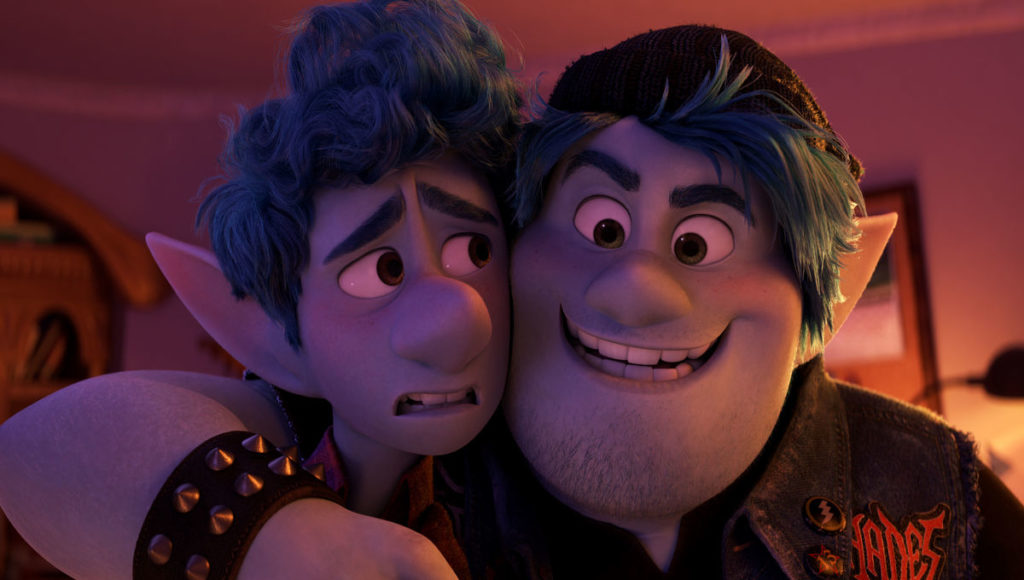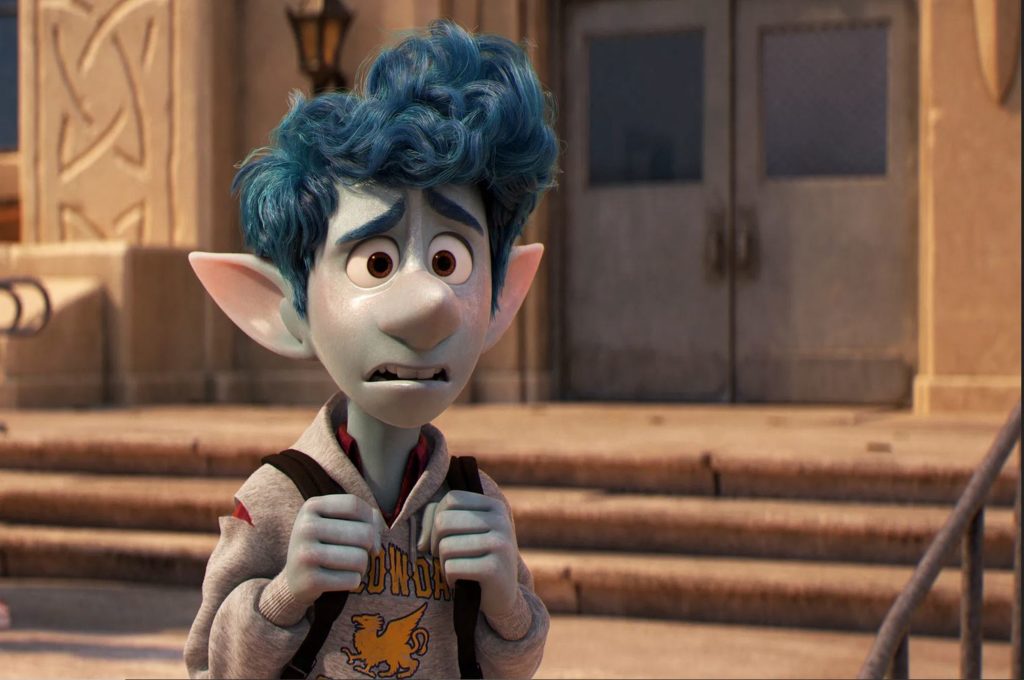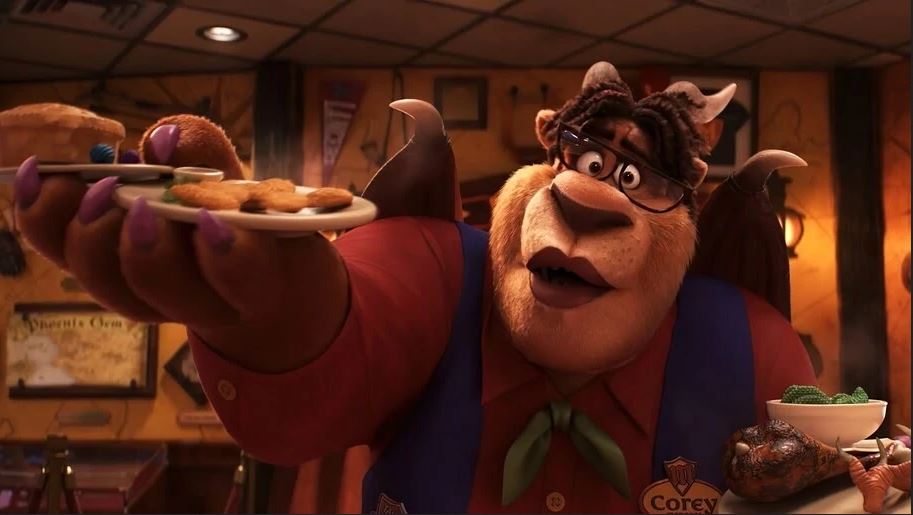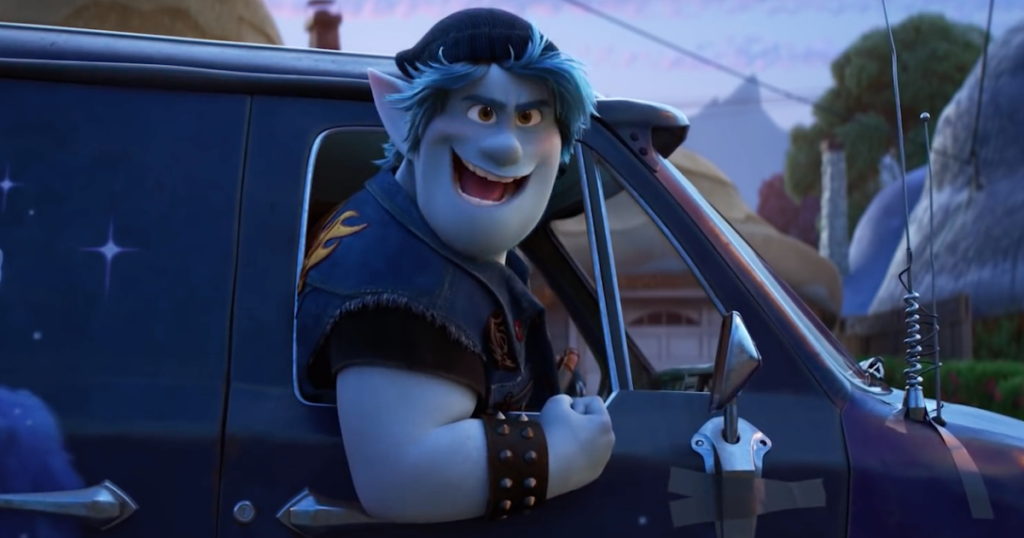
The world is gripped by existential despair, so what’s better to capture our collective terror than a Pixar movie? The wizardly corporation owns a patent on brightly colored, child-friendly entertainments that nevertheless speak to adults’ bone-deep fears. Of course, Onward, the newest adventure from the preeminent purveyor of computer-generated animation, isn’t about the coronavirus, no matter how tempted we might be to perceive everything through the lens of that horrifying pandemic. But it is about people—and a world—crippled with fear and self-doubt, struggling to adapt to unforeseen circumstances. That it’s also a playful children’s movie with a happy ending comes as something of a relief, even if it also currently feels like wishful thinking.
But enough about impending global catastrophe. Besides, there’s a more obvious metaphor to be found in Onward. At one point, its two brothers, Ian (voiced by Tom Holland) and Barley (Chris Pratt), squabble over navigation, disputing how best to reach their destination. Ian, the more pragmatic of the pair, insists on taking the freeway, a straight shot to their goal. Barley, a fantasist with either grand ideas or delusions of grandeur, instead suggests that they follow the Path of Peril, a twisting road fraught with danger and uncertainty. The freeway is of course the logical choice, but in Barley’s view, it is the eccentricity of the Path of Peril—its literal and figurative curves—that makes traveling it worthwhile.
I wish I could tell you that Onward proceeds according to Barney’s sage advice—that it curls with oddity and imagination. Instead, this film, which was directed by Dan Scanlon from a script he wrote with Jason Headley and Keith Bunin, is more of a straight-line production. It is colorful, pleasant, and inoffensive. Its themes are laudable and familiar. Its narrative is appealing and predictable. It takes you where you want to go, offering little in the way of surprise or provocation.

This doesn’t make Onward a bad movie. Far from it; it’s thoroughly enjoyable, with sufficient sparks of ingenuity and sweetness to prevent it from lapsing into tired mediocrity. The problem is that we grade Pixar pictures on a curve. Once you put masterpieces like Finding Nemo, Wall-E, and Inside Out into the universe, delivering a good-enough product starts to feel like it’s neither good nor enough.
Perhaps my relative disenchantment stems from a sense of squandered potential. Onward is set in a realm called New Mushroomton, a vaguely anthropomorphic hive populated by all variety of creatures. Ian and Barley are blue-skinned elves. They have a pet dragon, a rambunctious critter who’s basically a Labrador with scales. Their mother’s boyfriend is a centaur. Yet despite its animal variety, New Mushroomton is a rather typical place, lacking in true flavor or personality. Its houses may take the shape of mushrooms, and its citizenry may include unicorns and gnomes, but for the most part it feels like Nowheresville, USA.
To be fair, the neighborhood’s frustrating ordinariness is baked into the film’s storyline. Onward conceives of a world where actual magic once thrived, but where our collective laziness has allowed it to dissipate. As a result, its fairly trite platitudes—the usual stuff about believing in yourself and conquering your fears—apply not just to its main characters, but to its broader universe. In embarking on their inevitable journey, Ian and Barley are fighting to reinvest their home with a soul.

About that journey: On Ian’s 16th birthday, his mother, Laurel (Julia Louis-Dreyfus), gives him a supposedly magical staff that once belonged to his father, Wilden, who died when Barley was a toddler and Ian was a newborn. It’s accompanied by a scrap of paper detailing a so-called visitation spell; as explained by Barley (who’s something of a wizarding enthusiast), the enchantment will allow Wilden to return for a single day. But something goes awry with the casting, and only the lower half of Wilden’s body materializes; to restore him to his full form, the brothers must locate a special jewel—known as a Phoenix Gem—before the sun sets.
Onward, then, is a quest narrative. It follows Ian and Barley on an episodic voyage, subjecting them to various trials and rounding out their personalities in the process. They meet a manticore (Octavia Spencer), a winged hybrid who’s afflicted with the same metaphysical ennui that shrouds the entire town; she was once a fearsome warrior, but now she slaves in a tavern, dutifully fulfilling orders for hungry, decidedly non-magical patrons. They also encounter some hot-tempered pixies, whose taste in vehicles and weaponry suggest that they’ve wandered out of a Mad Max movie. And they run through an Indiana Jones-style gauntlet full of deadly traps and runic riddles.
Scanlon, who also directed Monsters University, handles all of this material well enough. Wilden proves to be a versatile comic companion; once Ian straps a bulky jacket to his dad’s restless legs and tops it off with sunglasses and a baseball cap, Scanlon mines their predicament for some amusing Weekend at Bernie’s-style hijinks. Wilden’s oblivious energy also engenders one of the film’s most beautiful scenes, a playful interlude where his jitterbugging limbs inspire his sons to dance like nobody’s watching. Yet on the whole, Onward doesn’t feel truly bracing or virtuoso—that inimitable Pixar pizzazz. The animation is characteristically impressive but not quite striking, never approaching the vibrant luminosity of (by way of example) Coco. And the humor is passable but rarely flirts with actual cleverness.

What salvages Onward—what prevents it from becoming nothing more than a mere echo of superior pictures—is the relationship between its elven brothers. Ian, the putative protagonist, is a familiar type: gentle, gawky, and painfully unsure of himself. He doesn’t seem to have any friends, not because he’s bullied but because he can’t stomach the courage to invite his perfectly nice classmates over to his house. His diffidence marks him as sympathetic, but it also renders him somewhat irritating and stale. He may be the film’s hero, but he’s standard-issue.
Barley is different: He’s simultaneously nerdy and cool. His obsession with a Dungeons & Dragons-like role-playing game would typically stigmatize him as wimpy and awkward, but instead he’s brawny and confident, cruising around town in a rickety van (nicknamed Guinevere) with a Pegasus painted on the side. He’s also an unusually decent older brother, exhibiting protective instincts and genuine affection; when it becomes clear that Ian is the sibling who possesses an innate gift for spell-casting, Barley offers support rather than jealousy. He’s strong in deed and stout of heart.
And in its concluding stretch, Onward finally becomes worthy of him, acquiring a sliver of that heartfelt magic endemic to Pixar’s greatest works. (Curiously enough, the same was true of Monsters University; Scanlon is good at third acts.) The film’s climax is a lovely blend of action and emotion, with a gorgeous sunset giving light to its sweetest, savviest surprise. And if a late realization feels lifted from a similar scene in Inside Out, it’s still undeniably moving.
The title and trajectory of Onward suggest linear progress, but artistically speaking, the film really moves in a circle. It opens with potential, downshifts into disappointment, then gradually revs up toward promising again. In other words, if the majority of this movie reminds you that Pixar can do better, the rest of it gives you the confidence that it will.
Grade: B-
Jeremy Beck is the editor-in-chief of MovieManifesto. He watches more movies and television than he probably should.
